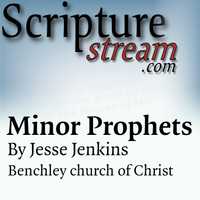-
Habakkuk 1-3
-
Introduction
-
The name Habakkuk means “embrace.”
-
The book was most likely written between 612 and 606 B.C.
-
-
Habakkuk 1
-
Habakkuk 1:1-4 – Habakkuk can’t understand why God allows evil.
-
Habakkuk 1:5-11 – God replies that His is bringing the Chaldeans to punish Judah.
-
Habakkuk 1:12-17 – Habakkuk asks how God can use people more wicked than Judah to punish Judah.
-
-
Habakkuk 2
-
Habakkuk 2:1-5 – The Chaldeans would be punished, but the just shall live by faith. It is a fundamental principle that God will punish evil. The passage is referenced from Romans 1:17; Galatians 3:11; Hebrews 10:30.
-
Habakkuk 2:6-19 – Woe to the Chaldeans! See Jeremiah 1. Babylon would be destroyed.
-
Habakkuk 2:20 – See Psalms 11:4.
-
-
Habakkuk 3
- Habakkuk 3:1-19 – Habakkuk’s prayer for deliverance.
-
Lessons for us:
-
The just shall live by faith.
-
The Lord is in His holy temple.
- God is still in control!
-
When doubts arise, take them to God.
- We can find the answers in God’s word.
-
While God’s judgments are for the punishment of the wicked, they are also for salvation of the faithful.
-
The differences between the evil and the righteous is pride vs. faith.
-
The man of faith will rejoice in the end.
-
Evil is self-destructive (Habakkuk 3:17-18).
-
In judgment, pray for mercy.
-
All will ultimately answer to God (II Corinthians 5:10).
-
The Lord is our strength (Habakkuk 3:19).
-
God has gone out for the salvation of his people (Habakkuk 3:13).
- He wants us to be saved, but the choice is ours!
-
JJ
January 06, 2021
For further study, see also:
Questions or comments? Join our Discord server for further study.
